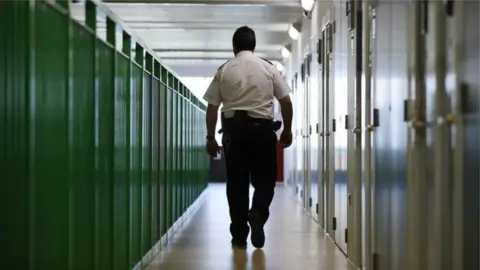Government outsourcing firm Interserve faces administration
 Getty Images
Getty ImagesInterserve is likely to go into administration on Friday.
Directors of the company, that employs 45,000 people in the UK, have told the BBC the firm has "a mountain to climb" to prevent it collapsing under the weight of its nearly £650m in debt.
A plan to swap the majority of that debt for new shares requires the support of more than 50% of the shareholders and the company's biggest shareholder - US hedge fund Coltrane which owns 27% - is currently dead set against the plan.
Since many small shareholders don't vote - even in a crisis like this - the support of Coltrane is seen as crucial in getting the deal through.
The board's plan would see current shareholders awarded 5% of the company - with the rest going to the creditors.
It is tempting to see Interserve as the next Carillion.
An-overly indebted private provider of public services going to the wall after years of suicide bidding to win government contracts at the same time as paying out big salaries and dividends.
While there are similarities, there are important differences.
Sales?
If the company collapses on Friday - this is what will happen.
Accountants EY will be appointed administrators, they will then sell the company for a nominal amount to the current lenders (a mixture of banks and bond holders) who will own 100% of the new company.
The banks would look to sell off different parts of Interserve's business in due course.
The board does not expect any interruption to the company's underlying contracts or any immediate job losses.
The real impact will be on the debate over the appropriateness of using big private sector contractors to carry out essential public service work.
Game of chicken?
The government has been monitoring the Interserve situation closely and while it has felt unable to award a company close to collapse much new work, the Cabinet Office and the Department for Business Energy and Industrial Strategy are comfortable services won't be interrupted.
In fact, Interserve - minus its crippling debts - will arguably be in one of the strongest financial positions of any outsourcer.
There may yet be a last-minute deal to save the company.
It is after all a curious game of chicken. If Coltrane insists on blocking the deal - it will get zero rather than the teaspoon of value its being offered under the board's plan.
The biggest loser - apart from the shareholders - will be the reputation of an outsourcing business model that will doubtless once again become a political football.
